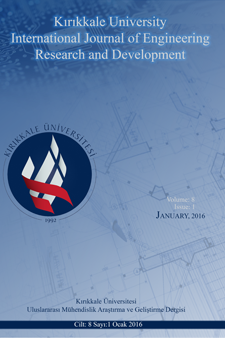Yüksek Hızlı Trenlerin Serbest Zemin Yüzeyinde Oluşturduğu Titreşimlerin Deneysel ve Analitik Olarak İncelenmesi
Trenlerin seyahat hızlarının artması ve tekrarlı
geçişleri, yüksek frekanslı dinamik yükleri meydana getirir. Titreşen demiryolu üstyapısı, titreşim
enerjisini çevresindeki zeminlere iletir. Demiryolu ağına yakın bölgelerdeki
yapılar zemin ortamının karakterine göre biçimlenen titreşimlerden etkilenir.
Kuvvetli yer hareketleri binalara ve temellerine hasar verebileceği gibi
binalarda yaşayan insanlara da konfor bozucu titreşimleriyle rahatsızlık
verebilir. Türkiye’de taşıma gücü zayıf, alüvyon zemin ve yoğun yerleşim
bölgelerinden geçen (Eskişehir-Adapazarı-İzmit), inşaatı devam eden ve
geçirilmesi planlanan yüksek hızlı trenler’in (YHT) çevrede oluşturdukları
titreşimlerin tespiti için şuana kadar herhangi bir saha araştırması
yapılmamıştır. Bu çalışmanın amacı, YHT’lerin yakın çevrede oluşturduğu
titreşimleri doğal saha koşullarında belirlemektir. YHT demiryolu hattına yakın
seçilmiş gözlem noktalarında, YHT trafiğinin ürettiği kuvvetli zemin
titreşimleri yedi yüksek kaliteli sismik sensör ile kayıt altına alınmış ve
titreşimlerin oluşturdukları pik ivme değerlerinin mesafeyle azalımı
hesaplanmıştır. Saha çalışması sonuçları, Bornitz’in iki nokta arasındaki
enerji azalımı ile ilgili olarak sunmuş olduğu analitik çözüm ile
karşılaştırılmıştır. Analitik yöntemin serbest zemin yüzeyinde oluşan düşey
ivme genliklerini tahmin etmede başarılı olduğu fakat yatay ivme kayıtları için
fazla kestirim yaptığı bulunmuştur.
Anahtar Kelimeler:
Yüksek hızlı tren, serbest zemin titreşimleri, yerinde zemin titreşim ölçümleri
Yüksek Hızlı Trenlerin Serbest Zemin Yüzeyinde Oluşturduğu Titreşimlerin Deneysel ve Analitik Olarak İncelenmesi
Railway platform which is vibrated with
higher frequency dynamic loads induced by high speed train cars transfer these
vibrations energies to surrounding ground and close by structures are effected
by them. Strong ground motion not only can give damage to the nearby buildings
and their footings but also effect the human comfort by undesired vibrations.
Extensive in-situ research are still required for both recent ongoing
construction projects in soft soil deposits (Eskişehir-Adapazarı-Izmit) and for
planned construction projects on highly populated areas
(Edirne-Istanbul-Ankara-Kars) in Turkey. The aim of the study can be summarized
as to determine comfort disturbance and devastating environmental vibration
created by high speed trains on free field. Strong ground motions induced by
high speed train measured and recorded at the inspection points selected at the
site close to high speed train line passing through highly populated regions.
Environmental effects of these vibration data compared and evaluated. However,
the applicability of a well know half space solutions based on Bornitz’s
analytical approach which takes account the loss of the amplitude of waves due
to geometrical damping and material damping of Rayleigh waves are investigated.
Bornitz’s solution tends to overlap vertical free field vibration with in-situ
measured records.
Keywords:
High speed train, free field vibrations, in situ measurement,
___
- [1] M. Bata 1971. “Effects on buildings of vibrations caused by traffic”, Building Science, Vol.6, No.4, pp. 221-246.
- [2] K. R. Massarsch, “Man-made vibrations and solutions”, State-of the-Art Lecture, Third International Conference on Case Histories in Geotechnical Engineering, St. Louis, Missouri, U.S.A., II, 1393-1405, 1993.
- [3] K. R. Massarsch, “Mitigation of traffic-induced ground vibrations”, Keynote Lecture, 11th International Conference on Soil Dynamics and Earthquake Engineering and 3rd on Earthquake Geotechnical Engineering, University of California, Berkeley, U.S.A, 2004.
- [4] H. Xia, Y. Cao, G. De Roeck, G. Degrande, “Environmental problems of vibrations induced by railway traffic”, Frontiers of Architecture and Civil Engineering in China, Vol.1, No.2, pp. 142-152, 2007.
- [5] F. Göktepe, “Yüksek Hızlı Trenlerin Çevre Yapılarda Oluşturduğu Titreşimlerin Önlenmesi İçin Bariyer Sistemlerin Etkinliğinin Parametrik Olarak İncelenmesi”, Doktora Tezi, Sakarya Üniversitesi, Fen Bilimleri Enstitüsü, Sakarya, Türkiye, 2013.
- [6] G. Degrande, L. Schillemans, “Free field vibrations during the passage of a Thalys HST at variable speed”, Journal of Sound and Vibration, Vol. 247, No.1, pp.131-144, 2001.
- [7]J.Branderhorst, “Modellen voor het boeggolfprobleem bij hogesnelheidstreinen. Ontwerp en validatie met behulp van de resultaten van de proef Amsterdam–Utrecht”, Master's Thesis, University of Twente, Enschede, Netherlands, 1997.
- [8]L.Auersch, Forschungsbericht 155, Bundesanstalt für Materialforschung und-prüfung, Berlin, Zur Entstehung und Ausbreitung von Schienenverkehrserschutterungen-theoretische Untersuchungen und Messungen an Hochgeschwindigkeitszug Intercity Experimental, 1989.
- [9] K. Adolfsson, B. Andréasson,, P-E. Bengtson, A. Bodare, C. Madshus, R Massarsch, G. Wallmark,, P. Zackrisson, “High speed lines on soft ground. Evaluation and analyses of measurements from the West Coast Line”, Technical Report, Banverket, Sweden, 1999.
- [10] R. Güçlü, M. Metin, H. Yazıcı, N.S. Yalçın,“Raylı Sistem Titreşimlerinin Yolcu ve Çevre Üzerindeki Etkilerinin İncelenmesi”, TÜBİTAK 1001 Bilimsel ve Teknolojik Araştırma Projesi, MAG, Proje No: 106M443, 2007-2010.
- [11] E. Çelebi, S. Fırat, G. Beyhan, İ. Çankaya, İ. Vural, O. Kırtel, “Field experiments on wave propagations and vibration isolation by using wave barriers”, Soil Dynamics and Earthquake Engineering, Vol.29, No.5, pp. 824-833,2009.
- [12] Z. Öztürk, V. Arlı, Demiryolu Mühendisliği, İstanbul: ATM, 2009.
- [13] H. Amick,, M. Gendreau, “Construction vibrations and their impact on vibration sensitive facilities”, ASCE Construction Congress 6, Orlando, Florida USA, 2000.
- [14] D-S. Kim, J-S. Lee, “Source and attenuation characteristics of various ground vibrations”, Geotechnical Earthquake Engineering, Soil Dynamics III., Geotechnical Special Publication ASCE, Vol.75, No.2, pp. 1507-1517, 1998.
- [15] H. S. Kuyuk, F. Goktepe, E. Celebi, M. Aktas, E. Agcakoca, “Experimental study on liquid-storage tank and free field soil vibrations due to railway traffic”, in GEOTECHNICAL ENGINEERING: Internatıional Civil Engineering & Architecture Symposiumfor Academicians (ICESA), 145-157, Antalya, Turkey, 2014.
- Başlangıç: 2009
- Yayıncı: -
Sayıdaki Diğer Makaleler
A Promising Approach in the World: Tensile Structures Roofing
Talha EKMEKYAPAR, Alaa Tareq AL-SHAREEF, Derya BAKBAK
Fatih GÖKTEPE, H. Serdar KÜYÜK, Erkan ÇELEBİ, Muharrem AKTAŞ, Elif AĞCAKOCA
Prediction of Compaction Behaviour of Soils at Different Energy Levels
Farklı Sınıf Çimento Harcı Üretiminde Metakaolin Katkısı Kullanımının Araştırılması
Sismik Yüklere Maruz Yapı-Zemin Ortak Sisteminin Çözüm Sürecinde Temel-Zemin Etkileşiminin Sönümü
